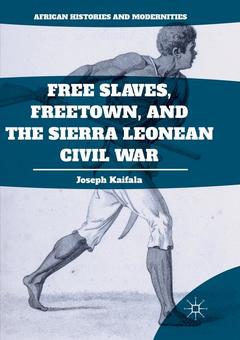Free Slaves, Freetown, and the Sierra Leonean Civil War, Softcover reprint of the original 1st ed. 2017 African Histories and Modernities Series
Auteur : Kaifala Joseph

This book is a historical narrative covering various periods in Sierra Leone?s history from the fifteenth century to the end of its civil war in 2002. It entails the history of Sierra Leone from its days as a slave harbor through to its founding as a home for free slaves, and toward its political independence and civil war. In 1462, the country was discovered by a Portuguese explorer, Pedro de Sintra, who named it Serra Lyoa (Lion Mountains). Sierra Leone later became a lucrative hub for the Transatlantic Slave Trade. At the end of slavery in England, Freetown was selected as a home for the Black Poor, free slaves in England after the Somerset ruling. The Black Poor were joined by the Nova Scotians, American slaves who supported or fought with the British during the American Revolution. The Maroons, rebellious slaves from Jamaica, arrived in 1800. The Recaptives, freed in enforcement of British antislavery laws, were also taken to Freetown. Freetown became a British colony in 1808 and Sierra Leone obtained political independence from Britain in 1961. The development of the country was derailed by the death of its first Prime Minister, Sir Milton Margai, and thirty years after independence the country collapsed into a brutal civil war.
Joseph Ben Kaifala is founder of the Jeneba Project and co-founder of the Sierra Leone Memory Project. He holds a JD and Certificate in International Law from Vermont Law School, an MA in International Relations from Syracuse University, and a BA in International Affairs and French from Skidmore College. He is a graduate of the Red Cross Nordic United World College.
Date de parution : 06-2018
Ouvrage de 345 p.
14.8x21 cm



